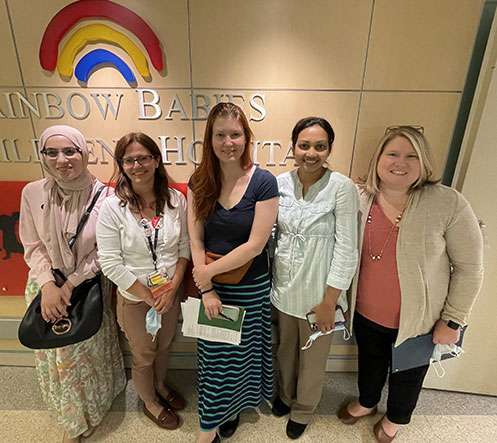Clinical Training

The fellows entering this program are well-trained, excellent pediatricians who have graduated from accredited pediatric residency programs and are board-eligible in general pediatrics. Our Training Program builds upon this background, providing a longitudinal clinical experience that prepares a pediatrician to diagnose and manage the full range of outpatient and inpatient endocrine disorders, including diabetes.
The Clinical Experience:
Clinical training in the program includes inpatient/consultative care and 2-3 days per week of endocrine outpatient clinics at the various locations within the UH Rainbow Babies and Children’s Hospital system. Fellows spend a total of 21 months in clinical training and 15 months on research. A unique timeline emphasizes clinical work for 16 of the first 18 months of the fellowship during years 1-2. A second clinical block occurs during the final 6 months of the 3rd year. This allows for a comprehensive clinical experience throughout all stages of fellowship training.
The inpatient clinical rotations are performed at UH Rainbow Babies & Children’s Hospital, which is an active primary care hospital and a major tertiary care center. Fellows are exposed to a unique mixture of acute endocrine cases ranging from the more common disorders, such as diabetic ketoacidosis and new onset diabetes, to rarer disorders, such as congenital adrenal hyperplasia, adrenal insufficiency and neonatal hypoglycemia. In addition, because of the many active clinical programs at UH Rainbow Babies and Children’s Hospital, fellows are also exposed to acquired endocrine dysfunction secondary to premature birth, critical illness, and systemic diseases such as cystic fibrosis and oncologic disorders. Fellows on the inpatient service also cover overnight calls and gain experience in managing outpatient endocrine emergencies, including sick day diabetes management.
The outpatient clinic schedule of fellows is designed to foster longitudinal care of children with chronic endocrine conditions. Physicians and staff in our division care for patients from a large area in northeast Ohio, spanning diverse geographic, racial, cultural and socio-economic backgrounds. Fellows are expected to assume primary responsibility for the care of patients with type 1 and type 2 diabetes as well as the full gamut of general endocrine disorders, including disorders of thyroid, growth, puberty, adrenal, calcium/bone, and sexual differentiation, as well as obesity and lipid disorders. Fellow clinics are staffed by dedicated faculty who provide teaching and supervision to each fellow as they care for patients. In addition to the general pediatric endocrinology and diabetes clinics, fellows also have the opportunity to participate in specialty clinics addressing the needs of children with Prader-Willi syndrome, Turner syndrome, lipid disorders, obesity, cystic fibrosis related endocrine disorders, and oncologic disorders. Programs dedicated to gender-affirming care and thyroid cancer are also in development.
Our division emphasizes team-based care and fellows are expected to actively integrate with the team in order to provide optimal care of patients. We have an excellent support staff including diabetes and endocrine nurses, dieticians, social workers, medical assistants and office staff. Our team also often includes learners such as rotating residents and medical students. The team approach provides excellent learning and teaching opportunities for our fellows as well as social and professional support.
Our physicians and staff care for over 900 children and adolescents with diabetes and over 3,000 children and adolescents with various endocrine disorders. The division averages more than 10,000 out-patient visits per year.
Children with diabetes account for more than 200 admissions per year to the Pediatric Endocrinology service. Our division provides over 300 in-patient consultations yearly, in the general pediatric ward, pediatric and neonatal intensive care units, the hematology and oncology unit and the child and adolescent psychiatry unit.


